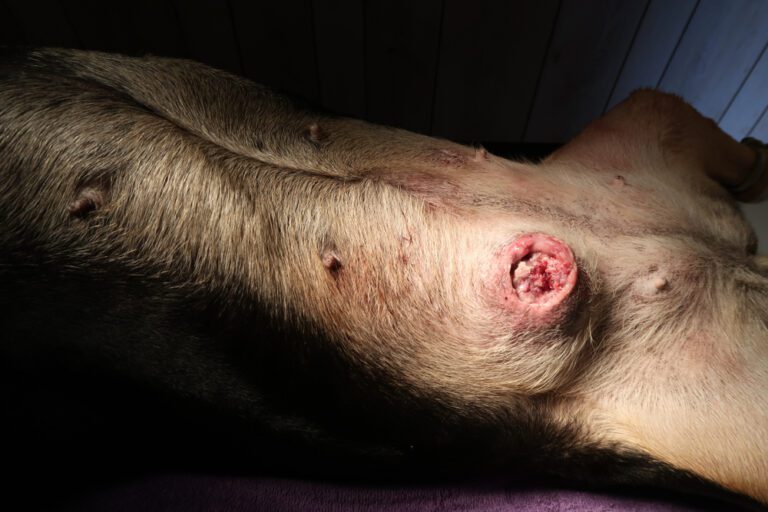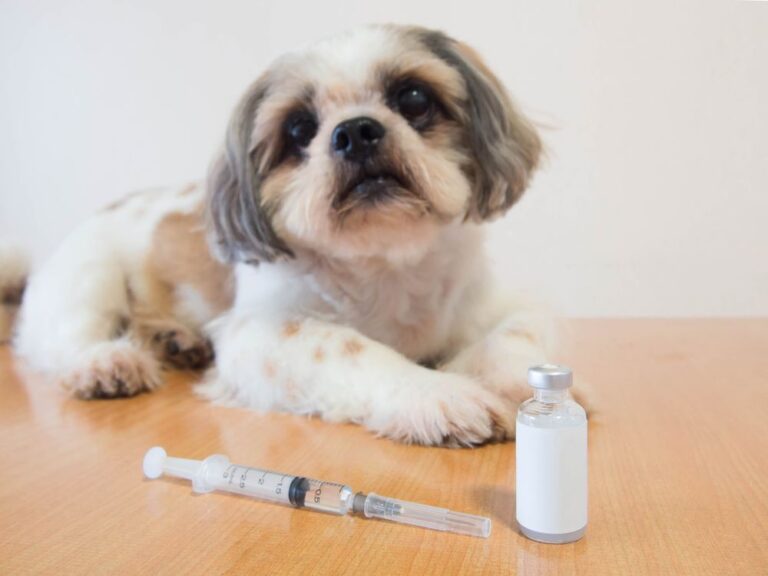A Comprehensive Guide to Common Health Disorders in Shih Tzus
Catching health problems early can help your Shih Tzu live a longer, happier life. It’s like solving a puzzle before it becomes too complicated. Early detection means we can manage or even prevent some health issues. This guide will help you know what to watch for and how to take action.
In this journey of caring for your Shih Tzu, you’ll learn how to spot common health issues. We’ll cover everything from breathing troubles because of their cute, squished faces to keeping those twinkling eyes bright and clear. Remember, a healthy Shih Tzu is a happy one, and that’s what we all want for our furry friends.
With a bit of knowledge and lots of love, you can ensure your furry friend enjoys a healthy, joyful life by your side. Let’s get started on this comprehensive guide to understanding and managing common health disorders in Shih Tzus!
1. Brachycephalic Syndrome in Shih Tzus
Shih Tzus, with their cute and squishy faces, are known as brachycephalic dogs. This term might sound complicated, but it simply means they have short noses and flat faces. While this gives them their unique and adorable look, it can also lead to health challenges. Let’s dive into brachycephalic syndrome, why it happens, and how we can help our furry friends breathe more easily.
What is Brachycephalic Syndrome?
Brachycephalic Syndrome refers to breathing problems that affect dogs with short noses. In Shih Tzus, this can mean they snore loudly (sometimes it’s cute, sometimes it’s not), struggle to breathe after a bit of exercise, or seem to gasp for air on hot days. Their airways are squished into their tiny, adorable faces, making it harder for them to catch their breath.
Why It Happens
Imagine breathing through a straw; it’s not easy, right? That’s how a Shih Tzu with Brachycephalic Syndrome feels. Their small airways, combined with the shape of their nose and throat, make it challenging for air to flow smoothly. This doesn’t mean your Shih Tzu can’t be happy and active, but we must be more careful with them.
Helping Our Furry Friends
Here’s the good news: there are ways to make life easier and more comfortable for your Shih Tzu. Here are a few tips:
- Keep them cool: Shih Tzus can overheat quickly, especially in warm weather. Ensure they have a cool, shady, relaxing place and plenty of fresh water.
- Watch their weight: Extra pounds can make breathing even harder for these little guys. Keeping them at a healthy weight is crucial.
- Take it easy: While exercise is essential, avoid strenuous activities, especially when it’s hot or humid.
- Regular vet check-ups: Your vet can give you more tips on managing Brachycephalic Syndrome and check for any other related health issues.
2. Keeping Your Shih Tzu’s Teeth Healthy
Shih Tzus are known for their loving nature and cute looks; they also have unique dental needs that require our attention. Dental health is crucial for these little companions, as it can affect their mouths and overall well-being. Let’s explore how to keep your Shih Tzu’s smile bright and healthy.
The Importance of Dental Care
Did you know dental problems can lead to other health issues in Shih Tzus? It’s true! Poor dental health can cause discomfort, making it hard for them to eat. It can also lead to more serious conditions like infections that can spread to the heart, liver, and kidneys. Caring for their teeth is about more than just a pretty smile.
Spotting Dental Problems
Keeping an eye out for signs of dental issues is key. If your Shih Tzu has bad breath, seems to have trouble eating, or you notice swelling around their mouth, it’s time to visit the vet. These could be signs that they need a little extra dental care.
Daily Dental Care Tips
Caring for your Shih Tzu’s teeth might seem daunting, but it’s easier! Here are some simple steps you can take:
- Brush their teeth regularly: Just like us, Shih Tzus benefit from regular tooth brushing. Use a dog-specific toothbrush and toothpaste to clean their teeth gently.
- Provide dental toys and treats: These are not just fun for your Shih Tzu; they also help clean their teeth as they chew.
- Regular vet check-ups: Your vet can perform dental check-ups and cleanings to help keep your Shih Tzu’s teeth in shape.
3. Hip Dysplasia in Shih Tzus
Hip dysplasia might sound like a significant, scary term, but it can affect our little Shih Tzus. Understanding what it is, how to spot it, and what we can do about it can help our furry friends lead more comfortable lives. Let’s break it down together.
What is Hip Dysplasia?
Hip dysplasia is a condition where the hip joint doesn’t fit together perfectly, causing it to move around more than it should. This can lead to discomfort and, over time, arthritis. Not just big dogs get it; our small but mighty Shih Tzus can, too.
Spotting the Signs
How can you tell if your Shih Tzu might have hip dysplasia? Look for signs like difficulty getting up or lying down, limping, or less interest in playing. If your happy little explorer starts acting more like a couch potato, it’s time to check in with your vet.
Helping Your Shih Tzu Manage
Finding out your Shih Tzu has hip dysplasia might feel overwhelming, but there are many ways to help them stay happy and active. Here are a few:
- Keep them moving: Gentle exercise can help keep their muscles strong and manage their weight, which is super important.
- Comfort is key: A comfy bed can make a big difference in how well they sleep and feel during the day.
- Pain management: Your vet can recommend medicines to help manage any pain or discomfort they’re feeling.
- Surgery: In some cases, surgery might be an option to help improve their quality of life.
4. Patellar Luxation in Shih Tzus
Patellar luxation might sound like a complex term, but it can affect our lovable Shih Tzus, impacting their ability to run and play as they love to do. Let’s simplify what it means, how to spot it, and ways to help your furry friend stay as happy and active as they deserve.
What is Patellar Luxation?
In simpler terms, patellar luxation is when the kneecap (patella) slides out of its normal position in the knee joint. Imagine your kneecap deciding to take a little journey away from where it’s supposed to be. For Shih Tzus, this can mean a skip in their step or even a momentary limp when the kneecap pops out of place.
Spotting the Signs
How do you know if your Shih Tzu might be dealing with this condition? Watch for signs like sudden limping, an odd way of running, or if they start holding up a leg for a bit while standing. It might be their way of telling you something’s wrong if they seem uncomfortable or hesitant to jump or play.
Helping Your Shih Tzu
Discovering your Shih Tzu has patellar luxation can be worrying, but there are many ways to support them:
- Weight management: Keeping your Shih Tzu at a healthy weight is crucial. Extra pounds can put more pressure on their knees, making things worse.
- Exercise moderation: Encourage gentle exercise to strengthen the muscles around the knee, but avoid activities that might put too much strain on their joints.
- Physical therapy: Sometimes, some physical therapy can help keep their legs strong and manage any discomfort.
- Surgical options: In cases where the luxation is more severe, surgery might be recommended to correct the position of the kneecap, allowing your Shih Tzu to move more comfortably.
5. Protecting Your Shih Tzu’s Precious Eyes
Shih Tzus can quickly melt our hearts with their big, expressive eyes. But those beautiful eyes are also susceptible to various problems. Understanding these issues can help us keep our furry friends’ vision clear and their eyes healthy. Let’s dive into the common eye problems in Shih Tzus, how to spot them, and what we can do to help.
Common Eye Problems in Shih Tzus
Shih Tzus can face several eye issues, including:
- Dry Eye: Their eyes don’t produce enough tears, leading to irritation.
- Cherry Eye: A gland in the eyelid becomes inflamed and visible.
- Cataracts: This makes their lens cloudy, affecting their vision.
- Corneal Ulcers: These are painful sores on the eye’s surface.
Each condition can make life uncomfortable for your Shih Tzu, so keeping an eye out (pun intended!) for any signs is critical.
Spotting the Signs
How do you know if your Shih Tzu has an eye problem? Watch for redness, rubbing their eyes more than usual, a cloudy appearance, or any unusual discharge. If their eyes seem to bother them or their behavior changes (like not wanting to go into bright areas), it’s time to check in with your vet.
How to Help Your Shih Tzu
Taking care of your Shih Tzu’s eyes doesn’t have to be complicated. Here are some simple steps to help:
- Regular Check-ups: Regular visits to the vet can catch issues early.
- Keep Their Eyes Clean: Gently wiping around their eyes with a soft, damp cloth can prevent irritation and infection.
- Protect Their Eyes: Consider using protective eyewear for dogs in windy or bright conditions.
- Immediate Vet Visits for Concerns: If you notice any of the signs mentioned, seeing your vet as soon as possible can make a big difference in treatment outcomes.
6. Tackling Allergies in Shih Tzus
Allergies are not just human issues; our Shih Tzus can suffer from them, too. It’s tough seeing our furry friends uncomfortable or in distress. Understanding allergies in Shih Tzus, spotting the symptoms, and knowing how to help can make a big difference in their lives. Let’s explore this together.
What Causes Allergies in Shih Tzus?
Allergies in Shih Tzus can be triggered by various things, such as:
- Food Ingredients: Some Shih Tzus may react to certain foods or ingredients.
- Environmental Factors: Pollen, mold, and dust mites can cause allergic reactions.
- Fleas: Flea bites can lead to allergic reactions in some dogs.
Each dog is unique, so what affects one may not affect another. The key is identifying what’s troubling your Shih Tzu.
Spotting the Symptoms
How do you know if your Shih Tzu has allergies? Look out for signs like:
- Itchy Skin: They may scratch more than usual or rub against furniture.
- Ear Problems: Shaking their head or scratching their ears often could be a sign.
- Skin Irritation: Red, inflamed, or bald spots can indicate allergies.
- Sneezing or Coughing: Dogs can have respiratory symptoms from allergies like humans.
If you notice these signs, visiting your vet for advice is a good idea.
How to Help Your Shih Tzu
Helping your Shih Tzu manage allergies involves a few steps:
- Identify the Allergen: Your vet can help you figure out what’s causing the reaction.
- Dietary Adjustments: Your vet may recommend a special diet for suspected food allergies.
- Regular Baths: Using hypoallergenic shampoo can help relieve skin irritation.
- Medication: Your vet may prescribe medication to control symptoms.
7. Ear Infections in Shih Tzus: Causes and Treatments
Ear infections are common for our Shih Tzus, causing discomfort and pain. Understanding why they happen and how we can treat them is crucial in keeping our furry friends happy and healthy. Let’s dive into the causes of ear infections in Shih Tzus, how to spot them, and effective treatments.
Why Ear Infections Happen
Several factors can cause ear infections in Shih Tzus:
- Moisture: Water trapped in the ear canal can lead to infections, especially after baths or swimming.
- Allergies: Allergic reactions can cause inflammation and increase the risk of infections.
- Ear Structure: Shih Tzus have floppy ears, which can trap moisture and debris, creating a breeding ground for bacteria and yeast.
Understanding these causes can help us prevent infections before they start.
Spotting the Symptoms
Knowing the signs of ear infections can help you catch them early. Look out for:
- Scratching and Pawing: It could be a sign if your Shih Tzu is constantly scratching at their ear.
- Shaking Their Head: Frequent head shaking is a common symptom of ear discomfort.
- Bad Smell: An unusual or bad smell coming from the ear is a red flag.
- Redness and Swelling: The inside of the ear may look red and swollen.
If you notice these symptoms, it’s time for a vet visit.
Effective Treatments
Treating ear infections in Shih Tzus involves a few steps:
- Cleaning: Your vet might clean your dog’s ears to remove debris or buildup.
- Medication: Antibiotics or antifungal medications can be prescribed to tackle the infection.
- Ear Drops: Medicated ear drops can help reduce inflammation and treat the infection.
- Prevention: Regular ear cleaning and keeping the ears dry can prevent future infections.
8. Intervertebral Disk Disease (IVDD) in Shih Tzus
Intervertebral Disk Disease, or IVDD, is a condition that can affect our beloved Shih Tzus, causing them pain and affecting their mobility. Learning about IVDD, how to recognize it, and the ways to manage it can make a significant difference in our furry friends’ lives. Let’s explore this condition together, keeping things straightforward.
What is IVDD?
IVDD occurs when the cushioning disks between the vertebrae of the spine either bulge or burst into the spinal cord space. These disks can then press on the nerves running through the spinal cord, causing pain, nerve damage, and even paralysis. Imagine the shock absorbers between the spine’s bones not working properly, making every movement potentially painful.
Spotting the Signs of IVDD
Recognizing the symptoms of IVDD early can help get your Shih Tzu the care they need. Keep an eye out for:
- Reluctance to Jump or Move: If your normally playful Shih Tzu suddenly seems cautious about moving, it could be a sign.
- Pain and Whining: They may cry out in pain when moving or being picked up.
- Weakness or Paralysis: In severe cases, they might have trouble standing or walking, especially in their hind legs.
- Changes in Behavior: Look for changes, like not wanting to eat or seeming generally uncomfortable.
Managing IVDD
Visiting the vet is crucial if you suspect your Shih Tzu has IVDD. Treatment can vary depending on the severity but might include:
- Medication: To reduce pain and inflammation.
- Rest: Strict rest is often necessary to give the spine a chance to heal.
- Physical Therapy: Can help strengthen muscles and improve mobility.
- Surgery: In some cases, surgery might be needed to relieve pressure on the spinal cord.
Supporting Your Shih Tzu
Dealing with IVDD can be challenging, but there are ways to support your Shih Tzu:
- Create a Comfortable Resting Area: Ensure they have a cozy, easily accessible place to rest without needing to jump or climb.
- Maintain a Healthy Weight: Extra weight can put more pressure on their spine, so keeping your Shih Tzu slim is important.
- Gentle Care: Be extra gentle when handling your Shih Tzu, avoiding pressure on their back.
9. Hypothyroidism in Shih Tzus: What You Need to Know
Hypothyroidism is a condition that can affect our Shih Tzus, leading to various health issues. But with the correct information and care, we can manage this condition together, ensuring our furry friends lead happy, healthy lives. Let’s delve into hypothyroidism, how to spot it, and how to treat it, all while keeping our language simple and heartfelt.
Understanding Hypothyroidism
Hypothyroidism happens when the thyroid gland doesn’t produce enough thyroid hormone. This hormone has a big job, helping control your Shih Tzu’s metabolism. Think of it like a thermostat for their body’s energy levels. When it’s not working right, many things can go off balance.
Signs Your Shih Tzu May Have Hypothyroidism
Keep an eye out for these clues that something might be off:
- Lack of Energy: It could be a sign if your normally playful pup seems more interested in napping than playing.
- Weight Gain: Gaining weight without eating more can be a clue.
- Skin and Coat Issues: Look for dry skin, thinning fur, or hair loss, especially on the tail and near the collar.
- Feeling Cold: If your Shih Tzu seems to be seeking out warm spots more than usual, it’s worth noting.
Diagnosing and Treating Hypothyroidism
If you suspect your Shih Tzu might have hypothyroidism, your vet can confirm it with a blood test. The good news is that once diagnosed, hypothyroidism is manageable. Treatment usually involves:
- Daily Medication: A daily hormone replacement pill can help manage the condition, making a big difference in your Shih Tzu’s energy and health.
- Regular Check-ups: Your vet will want to monitor your Shih Tzu’s hormone levels to ensure the treatment works.
Living Well with Hypothyroidism
A Shih Tzu with hypothyroidism can lead an everyday, active life with your care and attention. Here are some tips to help:
- Routine is Key: Giving medication simultaneously daily helps keep their hormone levels steady.
- Watch Their Weight: Keeping an eye on their diet and weight can prevent other health issues.
- Stay Observant: Regularly check your Shih Tzu for any changes in their condition or behavior, and report these to your vet.
10. Understanding and Managing Liver Shunt in Shih Tzus
A liver shunt is a health condition that might not be well-known but can significantly affect our Shih Tzus. Learning about this condition, recognizing its signs, and knowing how to manage it can make a difference for our furry friends. Let’s approach this topic carefully, making it easy to understand and actionable.
What is a Liver Shunt?
Simply put, a liver shunt is when the blood bypasses the liver instead of flowing through it. The liver is like a cleaning crew for the blood, removing toxins and helping digest food. When the blood doesn’t go through this cleaning process, toxins can build up in the body, leading to various health problems.
Signs Your Shih Tzu May Have a Liver Shunt
Keep an eye out for these symptoms, as they might indicate a liver shunt:
- Lack of Appetite: It could be a sign if your Shih Tzu isn’t as interested in food as usual.
- Lethargy: Less energy or sleeping more than usual might indicate something’s wrong.
- Gastrointestinal Issues: Vomiting, diarrhea, or constipation are common signs.
- Strange Behaviors: Walking in circles, staring blankly, or even seizures could indicate a buildup of toxins affecting the brain.
Diagnosing and Treating Liver Shunt
If you notice any of these symptoms, it’s important to consult your vet. They might recommend:
- Blood Tests: To check for elevated toxin levels and other indicators of a liver shunt.
- Imaging Tests: Ultrasound or CT scans can help locate the shunt.
- Surgery: In many cases, surgery can correct the shunt, allowing blood to flow normally through the liver.
Managing Liver Shunt
For Shih Tzus with liver shunts, both pre and post-treatment care are crucial:
- Dietary Management: Feeding a diet that’s easier on the liver can help manage symptoms.
- Medications: Your vet might prescribe medications to help control toxin levels in the blood.
- Regular Check-ups: Ongoing vet visits are essential to monitor their condition and adjust treatment.
Supporting Your Shih Tzu
Dealing with a liver shunt can be challenging, but your support can make all the difference for your Shih Tzu:
- Be Patient: Recovery and management can take time; patience and love are vital.
- Stay Informed: Learn about liver shunts and how to best care for your Shih Tzu.
- Love and Care: Your Shih Tzu needs your care and attention now more than ever. Ensure they feel loved and comfortable as you manage their condition together.
Regular Health Check-ups and Preventative Care for Your Shih Tzu
Keeping our Shih Tzus healthy and happy is a top priority for all who share our lives with these adorable companions. Regular health check-ups and preventative care are key to achieving this goal. Let’s explore why these are important and how they can help our furry friends enjoy a long, joyful life.
The Importance of Regular Vet Visits
Think of vet visits like a regular health check for a car. Just as a vehicle needs to be serviced to prevent breakdowns, Shih Tzus need regular check-ups to ensure they’re in tip-top shape. These visits can catch health issues early before they become serious, saving both heartache and potentially high medical bills.
What Happens During a Check-up?
A typical health check-up for your Shih Tzu might include:
- Physical Examination: The vet checks their overall condition, including their heart, lungs, eyes, ears, and teeth.
- Vaccinations: Keeping up with vaccinations helps protect your Shih Tzu from common diseases.
- Parasite Control: Regular checks for fleas, ticks, and worms are essential to keep your pet and your home pest-free.
- Diet and Weight Management: Your vet can advise keeping your Shih Tzu at a healthy weight.
- Blood Tests: These can help detect conditions like liver or kidney issues early.
Preventative Care at Home
In addition to regular vet visits, there are things you can do at home to keep your Shih Tzu healthy:
- Regular Exercise: Daily walks and playtime help keep your Shih Tzu fit and happy.
- Healthy Diet: It is crucial to feed a balanced diet suited to their age, size, and health needs.
- Dental Care: Regular brushing and dental treats can help prevent gum disease.
- Grooming: Keeping their coat brushed and clean prevents skin issues and keeps your Shih Tzu looking their best.
Creating a Health Care Routine
Establishing a routine for health care can make all the difference. Mark your calendar for vet visits, vaccination dates, and grooming sessions. Completing these activities as part of your routine ensures they aren’t overlooked.
The Power of Love and Attention
Never underestimate the power of your attention and love. You know your Shih Tzu better than anyone, so you’ll likely notice if something seems off. Trust your instincts—if you think something’s wrong, it’s always better to check with your vet.
Final Thoughts
Caring for a Shih Tzu goes beyond love; it involves understanding their health needs and being proactive about their care. Early detection, regular vet visits, a nutritious diet, and daily exercise are crucial. Embrace every moment with your furry friend, from quiet cuddles to joyful walks, as each strengthens your bond. You’re doing a fantastic job as a Shih Tzu owner. Your efforts ensure your pet enjoys a happy, healthy life.
Remember, you’re not alone. A supportive community of pet lovers and professionals is always here to help. Let’s continue to cherish and care for our Shih Tzus, ensuring they live their best lives filled with love and tail wags.
FAQs
How often should I take my Shih Tzu to the vet?
Aim for a yearly check-up. If your Shih Tzu is older or has health issues, every 6 months is a good rule of thumb.
What are the signs my Shih Tzu might have dental problems?
Bad breath, difficulty eating, and red or swollen gums are key signs. Regular checks can catch issues early!
How do I know if my Shih Tzu has allergies?
Look for itching, sneezing, or digestive issues. Identifying and avoiding allergens with your vet’s help is key.
Can Shih Tzus handle hot weather?
They can struggle due to their brachycephalic nature. Keep them cool, offer plenty of water, and avoid midday heat.







